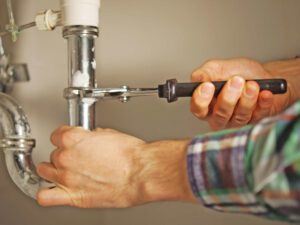A plumber installs, maintains, and repairs plumbing systems, which provide water, sewer, and gas to homes and businesses. They also connect and repair fixtures such as bathtubs, sinks, and toilets.

A plumbing specialist can have a variety of skills and experience, and they may be able to specialize in a specific area of work. They may also have knowledge of building regulations and safety standards, and legal expertise.
A plumbing system is the set of pipes and equipment that connects your home’s water supply, drains and appliances. It also removes waste from your home and disposes of it in a municipal sewer or septic tank.
Your plumbing system starts with the main water line that runs from your city water source to your house. Once the water enters your home, it’s pumped under pressure to a network of supply pipes that branch out from plastic, iron or copper and carry fresh water to every fixture in your home.
After the main lines, your home’s plumbing system includes drains that transport used water away from the house and vents that help prevent airborne debris in your water supply lines. It also includes a wastewater system that pushes waste water into the municipal sewer or septic tank,, depending on your home’s type.
When your plumbing system is installed, the plumber must ensure that the new piping has a firm connection to existing lines and that any appliances connected to the plumbing are properly fitted. The plumber will also inspect the new piping for leaks, seals or connections before turning the water back on and testing the results.
As part of the installation, the plumber will cut holes in the wall or floor to expose the pipes and expand them into their new locations. They will also remove any drywall or tiles that will be affected by the expansion.
They will then lay down plastic sheeting to protect the area and make it easier to work. The plumber will open the path to the new piping and install it, taking care that all of the valves, connections and seals are secure.
Once the piping is in place, the plumber will install the fixtures and appliances that will be connected to the new plumbing. These include sinks, toilets and other household appliances.
Most plumbers work under a professional license. They typically complete an apprenticeship that combines classroom instruction with paid on-the-job training. They are then licensed by their state to work independently. The requirements to become a plumber vary by state, but it usually requires an equivalency degree and at least two to five years of practical experience.
Plumbers repair plumbing, sewage systems, water heaters, sinks and other fixtures in homes and commercial buildings. They are responsible for repairing leaks, clogs and malfunctioning faucets, as well as for identifying potential problems before they become serious.
The best way to determine if you have a plumbing problem is to inspect your system for any obvious signs of trouble. For example, if you notice that your toilets sporadically run without flushing, there may be a leaky toilet or a leaking tank. Also, listen to the sounds your pipes make when they are flowing.
A good plumber will also be able to identify the source of the problem so that they can fix it correctly the first time around. Often, a plumbing problem is caused by the homeowner’s negligence, such as throwing paper towels or feminine products down the toilet, which can cause extensive damage to the system.
It is important to remember that a dripping faucet does not necessarily indicate a faulty pipe, but the water can damage walls, ceilings and flooring in your home. For this reason, it is always a good idea to have your water shut off before you attempt to do any repairs on your own.
Leaky pipes are a common occurrence in homes, but it’s possible to prevent these disasters by hiring a professional. In fact, they can even save you money by repairing your faulty plumbing before it causes any real damage to your home. As a bonus, they can help you keep your home more sanitary and safe by fixing leaky plumbing, which can decrease the chances of a sewer backup in the future. So, if you are in need of a plumbing professional to solve your problem, give us a call today!
